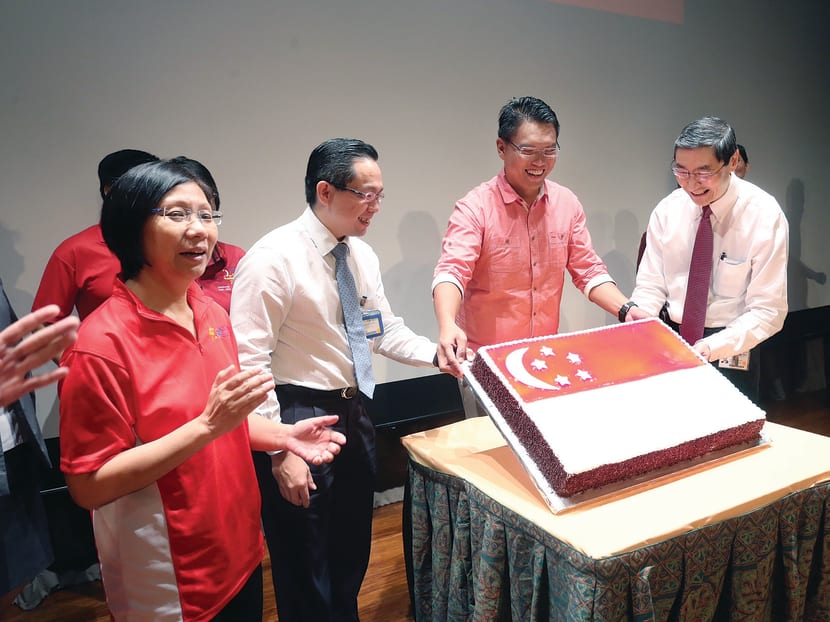Shot in the arm for lower-wage workers in healthcare sector
SINGAPORE — At National University Hospital (NUH), the patient service associates (PSAs) who register patients and handle enquiries will soon be capable of doing more.

At the National Day Observance Ceremony yesterday (from left): Ms Diana Chia, president of NTUC; adjunct associate professor Joe Sim, chief executive officer of NUH; Mr Patrick Tay, assistant secretary-general of NTUC; and Professor John Wong, chief executive of National University
Health System. PHOTO: NATIONAL TRADES
UNION CONGRESS
SINGAPORE — At National University Hospital (NUH), the patient service associates (PSAs) who register patients and handle enquiries will soon be capable of doing more.
After being trained in basic patient care and safety skills — such as how to move a patient from a wheelchair to the couch — the PSAs will help ease some of the nurses’ workload and, in expanding their job scope, pave the way for better wages.
Such efforts by public healthcare institutions are part of the overall drive to help improve the pay of lower-wage public healthcare support workers by the Healthcare Cluster Tripartite Workgroup — and these are bearing fruit.
By the end of this year, the group would have helped more than 5,000 lower-wage workers — those who are earning below S$1,700 per month — raise their salaries by an average of 15 per cent. The number of beneficiaries helped is more than double the figure initially targeted when it launched in 2012. This was achieved by helping the workers enhance their skills, increasing productivity and providing them with more opportunities to advance to higher-level jobs.
Revealing this at the National Day Observance Ceremony hosted by the National University Health System yesterday, National Trades Union Congress (NTUC) assistant secretary-general Patrick Tay shared examples of the measures employed.
For example, several hospitals — including NUH, Tan Tock Seng Hospital and Khoo Teck Puat Hospital — implemented an enhanced career track with relevant training and coaching to help their PSAs move up the career ladder.
Initiatives have also been carried out at a pilot level to increase productivity and efficiency of work, such as the Pharmacy Stock Receiving System, which uses a personal handheld device for the pharmacy department to receive, pack and distribute drugs.
“Higher productivity (achieved) by using technology, in this case assistive devices, will lead to higher manpower and time savings for the organisation. Through this, part of the costs saved due to productivity gains will be shared with their workers,” said Mr Tay.
Ms V Inthira, who has been working at NUH for almost 26 years, was among those who have benefited from efforts to create new career progression paths. Formerly a PSA, she was promoted to service executive this year, after being selected to attend leadership and supervisory skills courses.
“Ten years ago, it (would be) unheard of for a PSA to take up an executive role,” said the 47-year-old. With her career appearing to stagnate, she even thought of a mid-career switch eight years ago as she felt unmotivated to stay on. Through her promotion, Ms Inthira said her wages had increased by 10 per cent.
Moving forward, the workgroup will be looking at advancing productivity for the intermediate- and long-term healthcare institutions, for which details will be announced later this year.
Meanwhile, the labour movement’s Employment and Employability Institute has helped place 3,000 Singaporeans in jobs in the healthcare sector, 64 per cent being mid-career workers aged 40 and above, and 9 per cent being young professionals, managers and executives. About 78 per cent of them are women, with some of them being back-to-work women.






